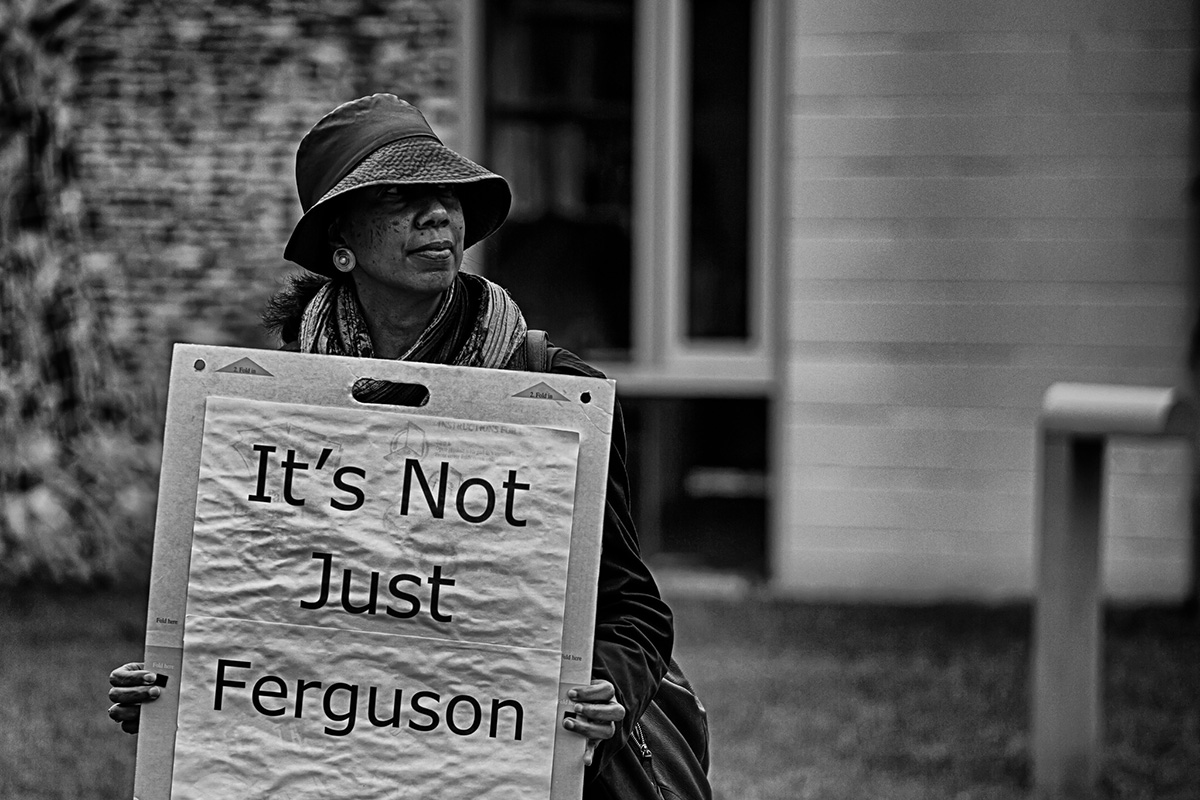My role as processing archivist at the Smithsonian Center for Folklife and Cultural Heritage is much more dynamic than merely caring for archival materials. Every day I meet people within and beyond the organization who are striving to express their truths because they know that the Center’s mission is to serve as a platform to amplify their voices and to facilitate intercultural dialogue. In light of recent events in Ferguson and other places, I’ve been reflecting on where the Center has been, where it is going, and the degree to which I—and other staff—might shape its efforts.
For over twenty years, I have been studying the history of the banjo, not only to interrogate its commonplace associations as an instrument of whiteness, but also to recognize and value its African and African American heritage, exploring its inextricable links to the cultural trauma of slavery, the racist legacy of blackface minstrelsy, and our broader society that is all-too-often steeped in violence, discrimination, and oppression.
In order to support my ongoing research, I’ve made personal, practical, and professional decisions, which have resulted in some modicum of success. I’ve worked hard to spread the word about banjo history, find gainful employment as an archivist, and build a network of like-minded collaborators. And to what do I attribute these accomplishments? I am part of a system that isn’t broken; it was built this way.
On one hand, this system allows me to enjoy the benefits of collaborating with teachers, mentors, and colleagues who view me as a purpose-driven individual striving to achieve meaningful goals—something worth celebrating in any person’s life. On the other, I am conscious of the fact that I live within a centuries-old power structure that was built to privilege my whiteness*. Whether I like it or not, this privilege is not part of a broken system. It was built this way, based on imbalances that favor me over millions of others, and founded on unsubstantiated ideas about who I am.
A few years ago, I first became aware of the statement—“The system isn’t broken; it was built this way”—as part of the Occupy Wall Street movement. These two phrases resurfaced with the latest protests surrounding the grand jury decisions about the police killings of Michael Brown and Eric Garner, whose deaths have become symbols of a criminal justice system plagued by profiling and the big business pipeline of mass incarceration**. To this day, these nine words continue to challenge the way I reflect upon the state of the world, our country, my neighborhood, and, in particular, my professional practices.
I often wonder how these words might be interpreted here at the Center for Folklife and Cultural Heritage, an organization whose genesis was part of a generational response to the cultural asymmetries that came to a head in the mid-twentieth century. The Center was born out of the Folk Revival, multiple social and political movements, and a series of scholarly disciplines and community efforts. One driving force that propels the Center is the idea of cultural democracy, which is supposed to value cultural diversity, promote community participation, establish a platform for cultural heritage policy, and empower people for equitable access to resources. Yet, the idea of cultural democracy is only as meaningful as the systems that sustain its principles.
In the United States, we have a long, unresolved history of violence and discrimination based on race, ethnicity, gender, orientation, ability, religion, and class. This history is well documented by scholars, community members, and in the reminiscences and lived experiences of people with important stories to tell. In these days of social media and immediate access to information, we have unprecedented power to listen to these stories, and even though our system was built to maintain the status quo, many of us are striving to respond to what we hear.
Right now, the Center for Folklife and Cultural Heritage has a new opportunity to amplify those voices actively seeking substantive infrastructure for intercultural dialogue. Simply put, we need critical and inclusive discourse to shape the work that we do. We need approaches and methodologies that enable us to work with communities to address the inherent inequalities of the American experience. We need a Center for Folklife and Cultural Heritage that serves as both a mirror and a platform where the reflections of the things that need to be done are projected to those willing to hear, see, and respond to the fact that the system isn’t broken; it was built this way.
So where do we, as an organization, go from here?
* For more information on concepts of white privilege and institutional racism, see the writings of antiracism activist and essayist Tim Wise, including his 2011 book White Like Me: Reflections on Race from a Privileged Son.
** For more information on profiling and mass incarceration, see legal scholar Michelle Alexander’s 2012 book The New Jim Crow: Mass Incarceration in the Age of Colorblindness.
Greg Adams is an archivist in the Ralph Rinzler Folklife Archives and Collections. Grounded in critical heritage research and programming, he has spent the last twenty years working with researchers, collectors, musicians, dancers, and instrument builders to foreground the banjo’s multicultural history.


